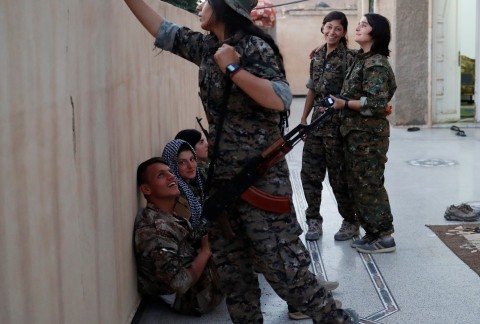A bullet almost killed this Kurdish sniper. Then she laughed about it.

A Kurdish sniper, reportedly targeting Islamic State fighters in the Syrian city of Raqqa, laughed in the face of death after a gunshot cracked into a wall above her head, showering her with chunks of concrete.
A video of the incident, posted online and circulating on social media, shows a female sniper purportedly of the Kurdish Women’s Defense Units, or YPJ.
Clad in a blue bandanna and standing in a nondescript building’s window, she acquires a target and squeezes the trigger on what appears to be a Dragunov rifle. In an instant, a bullet strikes the wall above her.
The sniper looks to the camera in startled disbelief, then sticks her tongue out after realizing what happened.
Mutlu Civiroglu, a Syrian and Kurdish affairs analyst, reviewed the video for The Washington Post and provided a rough translation.
“I killed Daesh,” the sniper says, using the Arabic acronym for the Islamic State, according to Civiroglu. Someone off camera said the bullet almost killed her. She laughs and asks to stop recording, Civiroglu said.
YPJ is an all-female wing of the Kurdish People’s Protection Units militia group, or YPG, a U.S.-backed group critical in the fight to retake terrain from the Islamic State.
Critics quickly questioned the veracity of the video, criticizing the sniper’s weapon handling and position or claiming it was fake.
Maximilian Uriarte, a Marine Corps combat veteran and creator of the popular Terminal Lance comic, pushed back on claims it was faked since it appears the shot comes from a different direction than she is engaging.
The unnamed woman’s left arm is emblazoned with a yellow patch bearing the face of Abdullah Ocalan, known also as Apo, a Kurdish nationalist and co-founder of the Kurdistan Workers’ Party, or PKK.
The PKK is designated a terrorist organization by the United States, and Turkey has long tied the YPG to the PKK. U.S. officials have maintained that they are separate organizations, with U.S. Special Operations forces working with YPG troops in the offensive to retake Raqqa.
Turkey criticized the United States after its Special Operations troops were photographed wearing YPG and YPJ patches near Raqqa in May 2016. The Pentagon later said it was “unauthorized” and inappropriate” for U.S. troops to wear those patches.Alex Horton is a general assignment reporter for The Washington Post and a former Army infantryman.